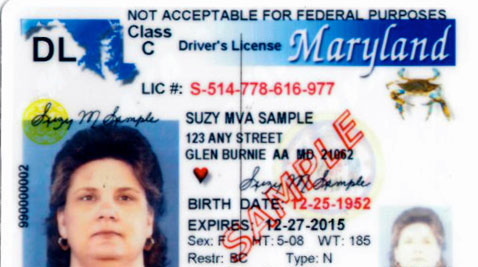ANNAPOLIS – Immigrants in the country illegally can begin the process to get a Maryland driver’s license beginning Monday, Nov. 4, according to Philip Dacey, a spokesman for the Maryland Motor Vehicle Administration.
RELATED STORY: Maryland’s newest citizens vote to defend undocumented immigrants
The first step is to schedule an appointment to get a driver’s license in January, Dacey said.

Under the Maryland Highway Safety Act, passed in early April, state residents who live in the U.S. illegally are now eligible for a license, effective Jan. 1, 2014, that cannot be used for federal purposes like boarding a plane or entering a government building, Dacey said.
The “second-tier license”—part of a two-tier licensing system that makes Maryland the only state on the East Coast to issue licenses to immigrants living in the country illegally—gives drivers the same rights on the road as a regular license, but cannot be used as identification. The words “Not Acceptable for Federal Purposes” is written across the top.
The qualification requirements for obtaining the license are also different.
In the case of a person who does not currently have a license, an identification card, or a moped operator’s permit, the applicant must provide evidence that he or she filed a Maryland income tax return or has been claimed as a dependent by someone who has filed a Maryland income tax return for the past two years, according to the law.
For documentation that a resident has paid two years of taxes or is a dependent, people can go to the Comptroller of Maryland office or website according to Dacey.

Additionally, an applicant must show proof of age, name and identity, and proof of Maryland residency, Dacey said.
“We’re emphasizing for folks to pay their Maryland taxes and get with the comptroller’s office sooner rather than later before tax season rolls around and the office is swamped with business,” said Kathy Dempsey, spokeswoman for the Maryland Catholic Conference, an organization that advocates for public policy issues and was a lead proponent of the legislation.
Other organizations including Casa De Maryland, the leading immigrant advocacy group in Maryland, the ACLU of Maryland and the Maryland Motor Vehicle Administration are also raising awareness of the new law.
“We’re going to reach out to this population that will be interested in acquiring the second-tier product,” said Buel Young, a spokesman for the Maryland Motor Vehicle Administration. “We’re in the process of developing brochures and radio ads, and things like that.”
The vehicle administration is expecting to issue about 135,000 learner’s permits and driver’s licenses to these individuals between fiscal years 2014 and 2018.
“It becomes a safety concern when individuals are not properly licensed,” Young said. “When someone has a license we know that they have met the minimum requirements to operate a vehicle in the state of Maryland…they have to go through driver’s education school and they are still required like anyone else to get a learner’s permit.”
If a person without a license who is over age 25 applies once the law goes into effect in January, that person could get a learner’s permit immediately and have a license within two months.
Someone below age 25 without a license could get a learner’s permit immediately and a license within 10 months.
“Maryland has a very large immigrant population and changes like this law are very important for these people to live normal and fulfilling lives,” said Sirine Shebaya, an attorney directing the ACLU of Maryland’s immigrant’s rights work. “Now these people can drive their kids to school and not have to worry about being arrested.”


You must be logged in to post a comment.